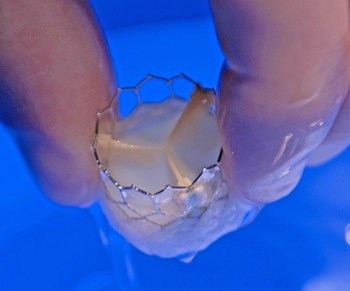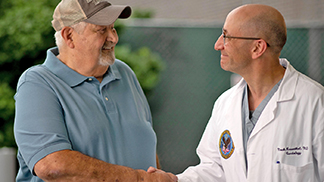For 100 Veterans at the Cleveland VA, TAVR means not having to undergo open heart surgery.
Transcatheter Aortic Valve Replacement (TAVR) is a procedure that delivers a replacement valve through a large leg or chest wall artery rather than the open heart surgery approach. Some patients, especially those with Aortic Stenosis, have other severe medical problems making open heart surgery dangerous.
Air Force Veteran Perry Fennell, 77, is one of those Veterans. Fennell suffered from increased fatigue and shortness of breath.
His primary care doctor at the Cleveland VA discovered a murmur during his heart exam and an echocardiogram detected severe Aortic Stenosis (AS), a degenerative narrowing of a heart valve. After further medical testing, he was referred to the Structural Heart Team.
Fennell had a history of other severe medical problems which were well managed but put him at increased risk for complications from open-heart surgery. He has a difficult time walking, and both he and his loved ones were very concerned about how he would manage after a major operation.
Once the Structural Heart Team completed and reviewed all the testing, it was decided that he would be a candidate for TAVR.
Home the next day
Fennell’s procedure on July 27, 2022, was the team’s milestone 100th TAVR procedure.
The procedure went exceptionally well. After a brief period of observation, Fennell was able to go home the very next day. Later in the week, he was on the mend, on his riding lawnmower, taking care of his yard and getting back to normal.
A little background
In 2017, medical professionals from the Cleveland VA developed a Structural Heart program. By 2019, construction on two state-of-the art hybrid operating rooms was completed. This allowed a space where advanced open operations, along with interventional or catheter-based procedures and operations, can be performed.
In the mid-2000s, TAVR was first introduced for patients who were inoperable. Later clinical trials demonstrated that the TAVR procedure was safe for patients who were considered high or moderate risk for complications with open heart surgery. In 2019, TAVR was considered for those who would have a low risk of complications from an operation to replace the valve.
In May 2019, the first TAVR was performed. The team has now performed 100 procedures with excellent results and lower than average complication rates.
Before the procedure can be performed, patients go through an extensive work-up process. The patients are generally older and may have other medical challenges. The Structural Heart Team meets with the patient to discuss the available treatment options and come up with the best plan for the patient.
In certain cases, surgery or TAVR may not be an option as some patients are at the end of their life.
Once a plan has been made, the patient will be prepped for the procedure. It lasts about 90 minutes with more than two thirds of patients going home the very next day with no incisions or special care. More than 90% go home by post-op day two. Surgery patients usually stay 5-7 days, and high-risk patients can stay much longer.
The teams
The positive outcome of Fennell’s procedure wouldn’t have been possible without the dedication and skill of the Structural Heart Team: Dr. Yakov Elgudin, chief, Cardiac Surgery; Dr. Noah Rosenthal, cardiologist and director of the Cardiac CathLab; Dr. Mohammed Najeeb Osman, cardiologist and electrophysiologist; Dr. Jonathan Goldberg, cardiologist; and Nurse Deborah Catania, Structural Heart coordinator.
The TAVR procedure is the result of collaboration from the physicians and their larger teams: cardiac surgery, cardiac cath, and EP lab and OR. Other departments, including anesthesia, echocardiography, radiology and vascular surgery all come together to perform the procedure for our Veterans at Cleveland VA.
Topics in this story
More Stories
Study underscores important role COVID vaccination can have in protecting Veterans from infection and reducing long-term health consequences
Columbia VA’s robotic surgery teams completed their 800th robotic surgery and are on schedule to hit 1,000 by the end of the year.
In a decentralized clinical trial, Veterans can participate from their own homes or local VA instead of having to travel to a research site.









Awesome story if I ever need that valve I’ll make sure I get over to that VA clinic in Cleveland.. Sergeant c r o v